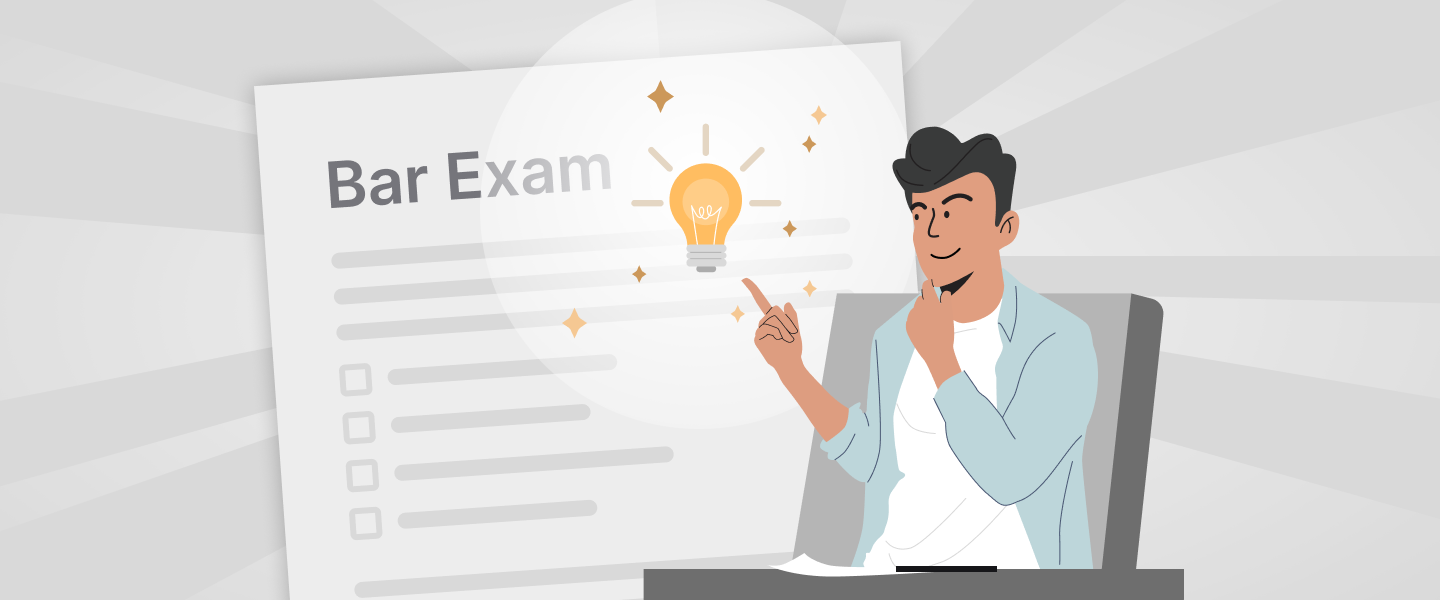
How to Study for the Bar Exam
The bar exam likely will be the most difficult test you’ve ever taken. The sheer volume of material you’re expected to know by heart is enough to overwhelm even the most experienced test-taker. While some examinees choose to “self-study” for the bar exam—i.e., create their own study plan and schedule—the large majority uses a bar-prep course. There are a number of benefits to using a bar-prep course when compared to self-studying:
- The material is organized in an efficient manner.
- Your schedule is set for you, so you don’t have to worry about pacing yourself properly.
- Some courses, including Quimbee Bar Review, offer expert feedback for essays.
- Thousands of other people have passed the bar exam using bar-review courses, so you know those study methods work.
When you sign up for a bar-review course, questions like, “how much time should I spend studying for the bar exam?” are already answered for you. Just follow the tasks assigned to you, and you won’t have to worry whether you’re spending too much (or too little) time studying.
Preparing for the Bar Exam
When studying for the bar exam, you’ll need to make sure you create the proper environment. You’ll need to have a quiet place that’s free from distraction and create set study hours. You already know how to do this—it isn’t any different from when you’re studying for finals. But when you’re studying all day for weeks on end, it’s easy to get lax. You might start “studying” from the couch while the TV is on or texting everyone in your contact list while a video lesson is playing. To be successful on the bar exam you have to study efficiently every single day. This requires an element of self-control. Distractions will abound all summer; it’s up to you to maintain your focus.
How Long Does It Take to Prepare for the Bar Exam?
The typical recommendation is that you spend a total of roughly 400 hours studying for the bar exam. If you are studying for the recommended minimum of nine weeks, that means 40 to 50 hours per week. Of course, if you have other obligations such as a job or family, you may not be able to dedicate this much time to studying. If you’ll be studying part-time, you’ll likely want to start studying four to five months before the exam.
What's on the Bar Exam?
The bar exam typically includes three sections:
- the Multistate Bar Exam (MBE)
- a long-form essay section
- a performance or “practical” section
If you’re in a Uniform Bar Exam (UBE) jurisdiction, the essay section will be comprised of the Multistate Essay Examination (MEE) and the performance section will be comprised of the Multistate Performance Test (MPT). For more details on what’s included in the bar exam, see Quimbee’s article on the bar exam.
Bar-Prep Courses
If you’re looking for the best UBE review course, look no further than Quimbee Bar Review. Quimbee Bar Review was designed specifically for the UBE, so you can have full confidence that you’re studying exactly the right material.
With over 300 on-demand lessons, more than 1,400 questions licensed directly from the NCBE, graded practice MEEs and MPTs, and thousands of additional MBE-style multiple-choice questions, Quimbee Bar Review has everything you could want in a UBE prep course. When you’re looking for a UBE review course, why would you settle for anything less?
Taking the Bar Exam
Studying for the bar exam is hard enough, but actually taking the bar exam is an entirely different animal. You’ve certainly heard the phrase, “It’s a marathon, not a sprint.” This may seem like an overworn platitude, but there’s no better way to describe the bar exam. The only way to get a good feel for the bar exam (without actually taking it) is to try a few simulated exams. If you’ve signed up for Quimbee Bar Review or Quimbee MBE Review, you’ll be able to take multiple simulated exams that will give you an idea of how to pace yourself and deal with the inevitable fatigue of the bar exam.
What Is the Bar Exam Like?
The administration of the bar exam will feel like any other standardized test you’ve taken—you’ll have to check in with your ID, find your seat, and sit through the proctor’s instructions. The one aspect of this experience that will likely be new to you will be the sheer size of the testing room, which can feel overwhelming. Our best advice is to ignore your surroundings. Like a horse in the Kentucky Derby, you need to put on your blinders and focus on the task ahead. Since there might be several hundred other students taking the exam with you, the process of getting everyone checked in and seated can seem never-ending. Just be patient and stay calm. If you’re into meditating, this is a great time to deploy that skill. You don’t want to waste any energy or mental output before the exam.
When the exam begins, just let your studying and practice kick in. Trust in your preparation and don’t let yourself get too worked up if you don’t know an answer. It’s common for examinees to feel like they started strong but faded toward the end of the exam. Don’t let this happen to you; you don’t want to lose precious points toward the end of the exam because you wore yourself out too soon. Again, the best way to ensure you have the stamina to focus throughout the exam is to take simulated exams throughout your studying.
You’ll get lunch breaks each day of the exam. Some examinees use this time to cram for the upcoming exam sections. This cramming is rarely useful. Instead, use your lunch break to clear your mind and make sure you plan ahead for a healthy, filling meal.
When you’re done, you’ll probably want to take a long, long nap. You’ve certainly earned it!
How Long Is the Bar Exam?
The UBE is administered over two days and consists of 12 hours of testing. The MPT and MEE are three hours each, and the MBE is six hours. The length of the bar exam may vary in jurisdictions that don’t administer the UBE. For more details, check out Quimbee’s jurisdiction-specific pages.
When Is the Bar Exam?
The MBE is given on the last Wednesday of February and July. The MEE and MPT are given on the preceding Tuesday.
Jurisdictions that don’t administer the UBE may offer their exams on different dates. For more details, check out Quimbee’s jurisdiction-specific pages.







